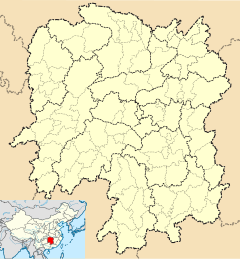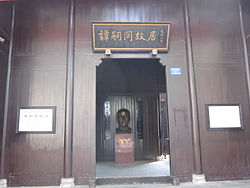Former Residence of Tan Sitong
Appearance
| Former Residence of Tan Sitong | |
|---|---|
谭嗣同故居 | |
 Former Residence of Tan Sitong. | |
| General information | |
| Type | Traditional folk houses |
| Location | Liuyang, Hunan |
| Country | China |
| Coordinates | 28°08′30″N 113°37′52″E / 28.141803°N 113.631073°E |
| Owner | Government of Liuyang |
| Technical details | |
| Floor area | 760 m2 (8,200 sq ft) |
| Grounds | 1,200 m2 (13,000 sq ft) |
The Former Residence of Tan Sitong or Tan Sitong's Former Residence (simplified Chinese: 谭嗣同故居; traditional Chinese: 譚嗣同故居; pinyin: Tán Sìtóng Gùjū) was built in the late Ming dynasty (1368–1644). It is located in Liuyang, Hunan.[1][2][3][4] The house occupies a building area of 760-square-metre (8,200 sq ft) and the total area over 1,200-square-metre (13,000 sq ft).[1]
History
[edit]From age 15 to 17, Tan Sitong lived here.
In November 1996, it was listed as a "Major Historical and Cultural Site Protected at the National Level" by the State Council of China.[1]
In April 2002, it was listed as a "Patriotic Education Base" by the Hunan Provincial People's Government.
Gallery
[edit]References
[edit]- ^ a b c Wang Xijia (2014), p. 22–23.
- ^ 谭嗣同故居被建停车场 市政府复议仍难阻(图). Ifeng (in Chinese). 2012-06-06.
- ^ 酒店停车场建在谭嗣同故居旁3年未整改. Sina (in Chinese). 2012-06-14.
- ^ 谭嗣同故居闭馆提质改造 开放时间未定. Liuyang.com (in Chinese). 2014-03-25.
Wikimedia Commons has media related to Tan Sitong's Former Residence.
Bibliography
[edit]- Wang Xijia (2014). 长沙史话 [A Brief History of Changsha] (in Chinese). Beijing: Social Sciences Academic Press. ISBN 978-7-5097-6662-0.









